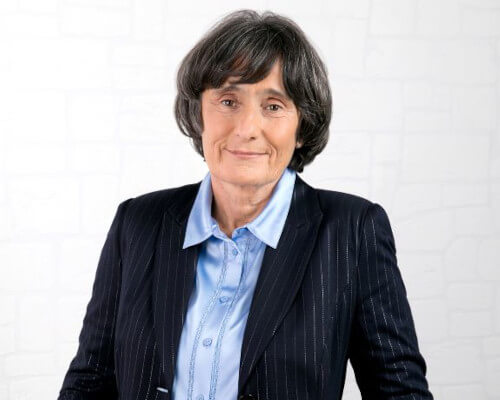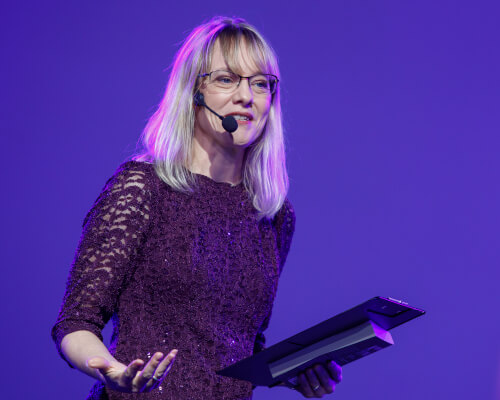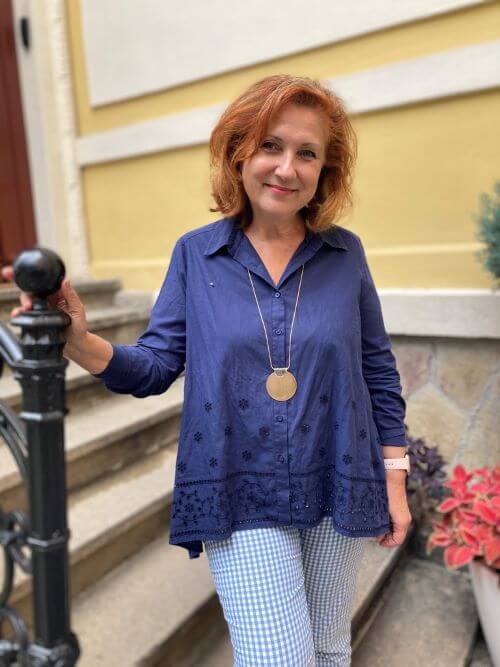
Vania Minkova started her professional life wanting to improve machines, so she pursued an engineering degree. However, she could not escape her family calling — both her parents were teachers — and spent her entire career to date aiding the development of humans as well as the symbiosis between human beings and technology. First in the corporate world and for the past decade as a member of the management board of the Council of Women in Business in Bulgaria, she has helped advance hundreds of young Bulgarians’ professional and personal growth.
The Council of Women in Business unites companies and individuals in the goal of promoting women’s inclusion and development in Bulgaria’s economy and public life. The Council is also the America for Bulgaria Foundation’s partner in launching three editions of Business Academy for Starting Entrepreneurs, the Foundation’s free entrepreneurship program, in Lovech, Troyan, and Veliko Tarnovo. In four years, BASE has helped dozens of individuals across Bulgaria build or expand small businesses creating hundreds of jobs.
We spoke to Ms. Minkova about the Council’s activities and about her work to empower young Bulgarians.
Short bio: Vania Minkova has many years of experience in HR management and development at large industrial production and energy companies in Bulgaria. She has a master’s degree in industrial automation and an MBA. She has specialized at a number of universities and organizations in Bulgaria and abroad.
America for Bulgaria Foundation: The Council of Women in Business in Bulgaria is a unique organization featuring some of Bulgaria’s most prominent women in business. How did it come about, and what were the motivations of its founders, you among them?
Vania Minkova: Soon our organization will turn 10. It came about as a natural response to a persistent phenomenon in our country. Every emerging or reforming business sector or entity began to rely increasingly on women with a proven business and performance record — women who were hardworking and educated, ambitious and determined, ethical and loyal. This includes industries such as banking and insurance, information and communication technologies, engineering and industry, trade and services, pharmaceuticals and medicine, and even traditionally male-dominated sectors such as mining and energy.
So, several of us women got together and decided to start a common initiative to support the career opportunities and achievements of women in our country’s economy. We realized that such an organization can help pass on the experience, knowledge, and abilities we have gained, in a more organized way, to those coming after us and needing encouragement. Regardless of their professional field, women in the process of developing and establishing themselves need three things: the right competencies, encouraging support, and an extensive network. The Council of Women in Business provides all three things.
ABF: The role of women in almost every economic sector in Bulgaria is tangible. Some commentators even speak of a Bulgarian model when it comes to female participation in the economy. What’s your take on that?
V.M.: According to Eurostat [the European Union’s statistical arm, ed.], we are in the top three countries with the highest number of women in the field of new technologies in Europe, which is really an achievement. Women here are versatile, capable of multitasking, highly organized, highly loyal, free from an early age to choose for themselves, and not subject to prejudice as much as women in other systems and countries are. This creates an incredible environment, one that gives birth to hardworking, talented, successful women. The women in the Council, for example, have all reached the highest levels of management at Bulgarian and multinational companies.
I am also really happy to see women take their first steps in entrepreneurship, especially through programs like BASE, and work hard to preserve small family businesses — businesses that provide a livelihood for people all around us.
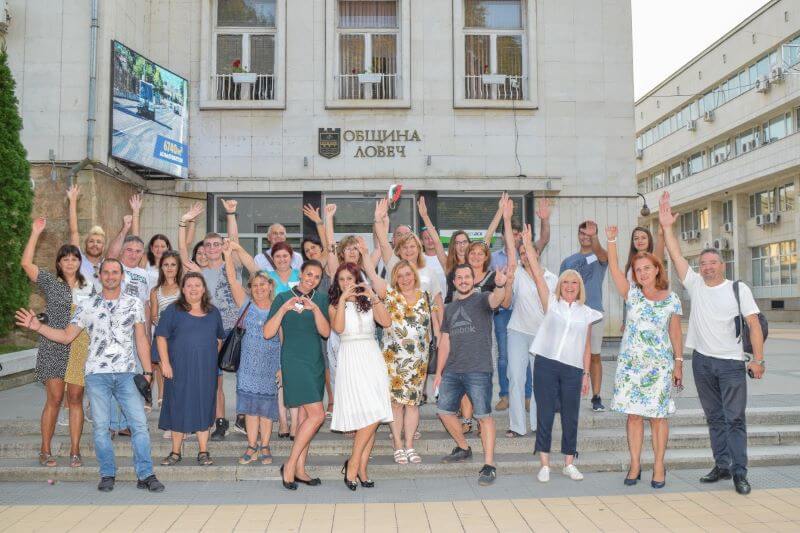
ABF: What motivates your own interest in initiatives promoting youth development?
V.M.: The short answer is family, destiny, and karma. I grew up in the family of teachers, who were required by Bulgarian society and traditions to dedicate themselves to their students. This attitude to life had a profound effect on me. From my first day at work, after graduating from university, I have been involved in selecting and training, motivating, managing, and mentoring young people. My partner and I even celebrated our union on Awakeners’ Day, November 1 [a national holiday honoring Bulgarian educators and other builders of modern Bulgaria, ed.]. We are happy to be united by such a personal and professional fate: we seek, awaken, and support young talents. In turn, they gift us with endless emotions.
ABF: What Council programs are specifically aimed at youth development?
V.M.: This year we are launching the eighth edition of our Leadership Academy. Nearly 300 young women from the corporate and startup worlds have gone through this emblematic one-year program of the Council. Through a series of trainings, seminars, and discussion forums, the Academy strengthens women’s initiative and entrepreneurial spirit, encouraging them to expand their businesses and take on greater responsibilities.
“We Remain in Bulgaria” is our internship program. This year, the program’s seventh, 90 interns, united in the Council’s platform, build on what they have learned at university by gaining real-life business experience and connecting with top experts in their fields.
Our mentorship program is a natural continuation of the two abovementioned programs.
The new normal in which we live is a new area of focus. Women on the front lines coping with workloads, stress, and increased commitments, being effective in the digital environment, and navigating our sometimes-turbulent times — all this is part of the new normal that we must prepare for.
ABF: The Foundation and the Council have partnered in Business Academy for Starting Entrepreneurs (BASE) for nearly two years. What attracted the Council to this program, and how would you sum up the last two years?
V.M.: We started last winter, a month before the lockdown. Our first BASE course was in Lovech, in the summer of 2020, the second in the spring of this year, in Troyan, and we just started a third course in Veliko Tarnovo.
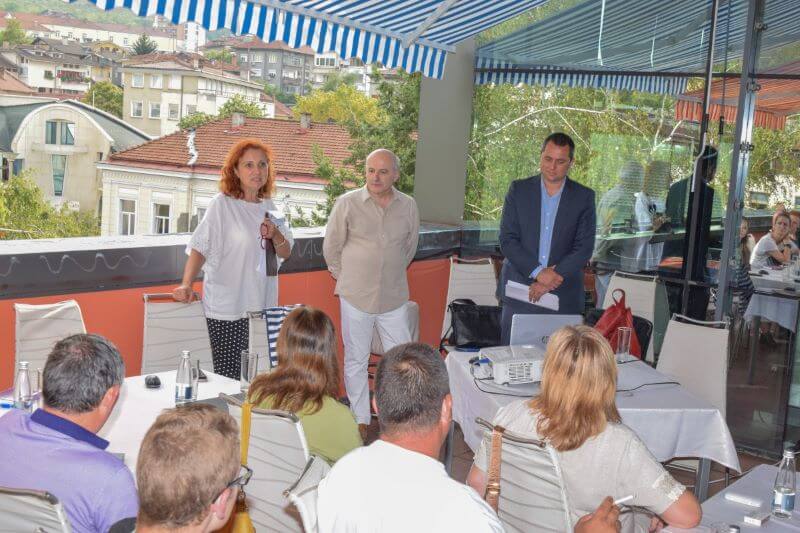
Our experience, the knowledge and best practices gained over the years, and the large pool of lecturers, mentors, and trainers from Council member companies make us a natural partner of the Foundation. On the one hand, most participants in the BASE trainings are women entrepreneurs and corporate leaders, whose work we know well from other Council projects. On the other hand, the caring, attentive approach and commitment of the lecturers help us achieve the program’s goals.
ABF: What do you look for in BASE applicants?
V.M.: We value diversity. In the new group in Veliko Tarnovo, as well as in the previous ones in Lovech and Troyan, we have people working with crafts — ceramics, woodcarving, restoration, leather; owners of guest houses, patisseries, and pizzerias; entrepreneurs — online traders, consultants, and event organizers; farmers; and social entrepreneurs. We also have new mothers who, engaged in caring for children and elderly parents, are looking for more flexible work opportunities. We have participants who are seeking the “key” and the right motivation to turn a childhood dream or a hobby into a business. Then, there are those who want to work for themselves but are still looking for their niche.
How do we select participants? We look for motivation to grow, for wide open eyes, for those who want to make their own path in life and are willing to take risks. We look for sustainable interest, for curiosity, and, most of all, for openness and the will to follow through.
ABF: How do you know that the program has achieved its goals?
V.M.: In our vision, this unique program, Business Academy for Starting Entrepreneurs, does not end with the jury and the awards; that’s where it starts. The efforts people put into realizing their projects thereafter are considerable, and this is where we are needed even more. I am a mentor in the new BASE Mentor project, through which we encourage and support the most active BASE graduates.
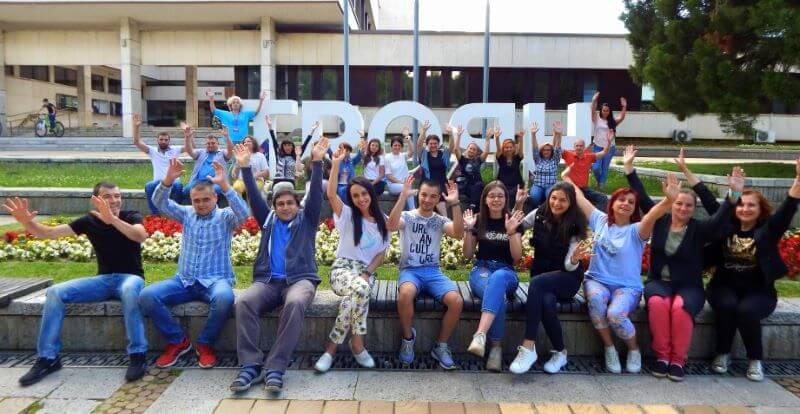
ABF: You seem to be saying that business and those who succeed in it have a social role. What is your view on this?
V.M.: As far as entrepreneurship is concerned, we at the Council find it difficult to separate business from social entrepreneurship and philanthropy. We believe that one shouldn’t follow the other; instead, they need to develop in parallel. For this to happen, it is not enough to read the theory and apply contemporary models for corporate social responsibility, environmental protection, and sustainable development. Bulgarian economic history is rich in great examples of successful entrepreneurs and patriots who share value with the communities in which they work and live even as they tend to their businesses. We need only look at the many old churches, social institutions, schools, and universities in the country — the fruit of their foresight, entrepreneurship, and empathy.
ABF: What brings you the most satisfaction professionally?
V.M.: As any busy, engaged professional, I enjoy the result, achievement, success, appreciation for work well done. We are extremely satisfied when we see the growth and success of someone young, hard-working, and talented who has benefited from our support. And we are especially happy when, even as they strive for professional or business success, they manage to preserve their humanity and socially engaged nature.
